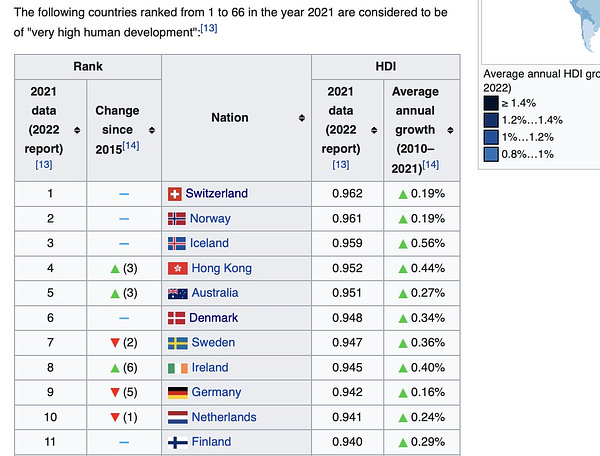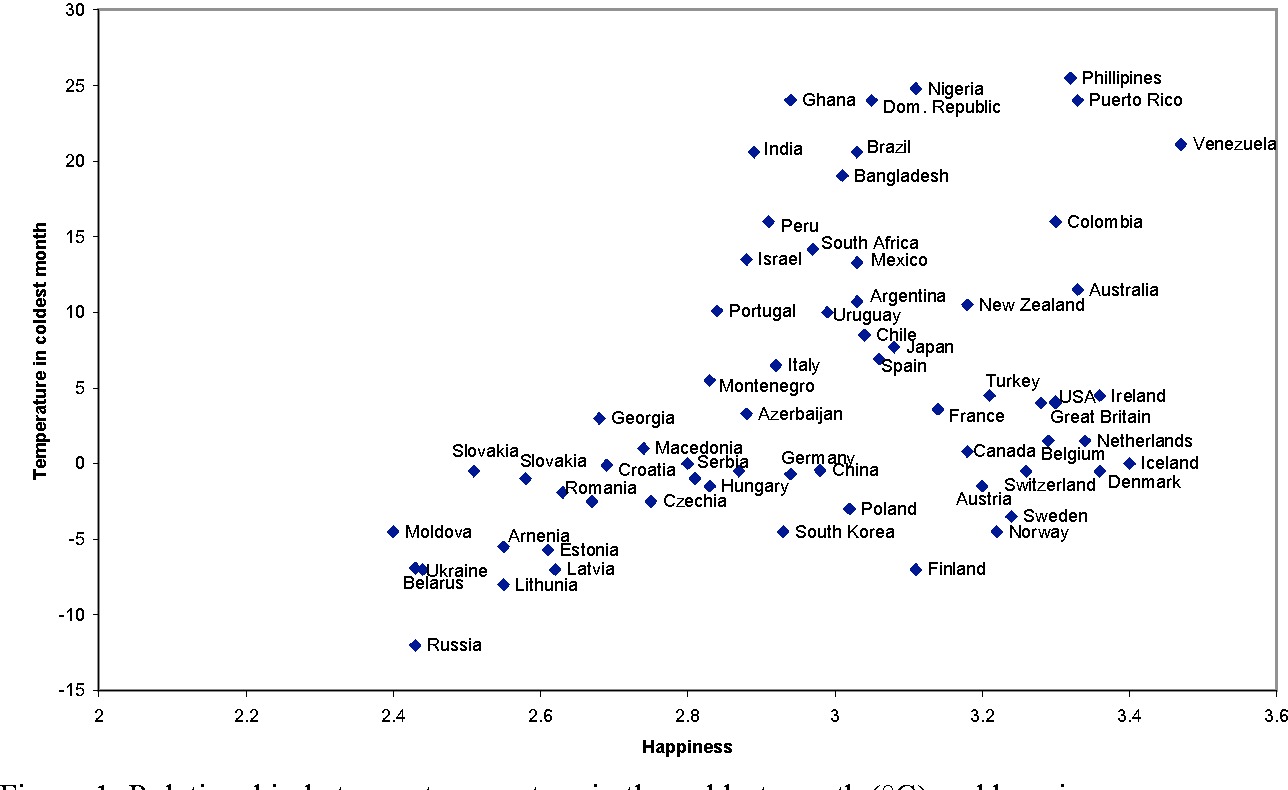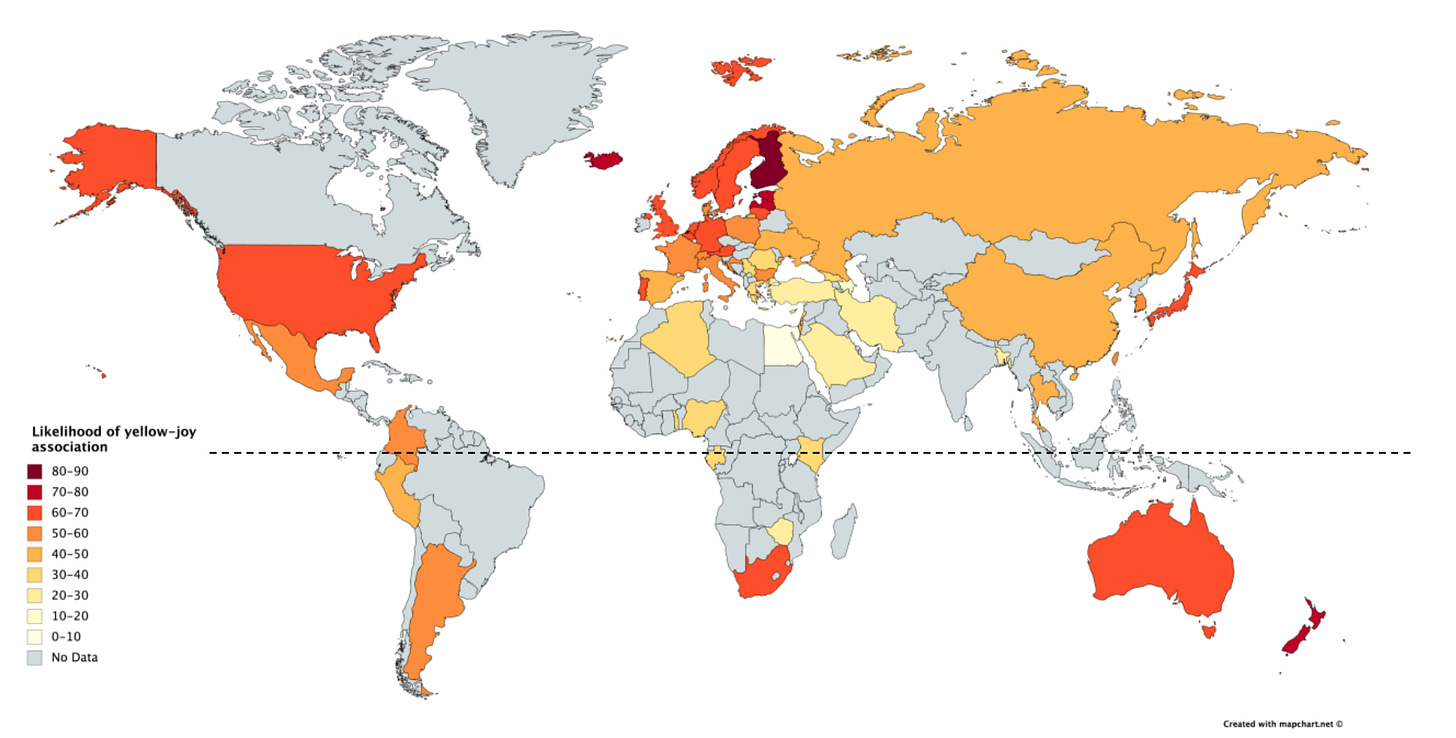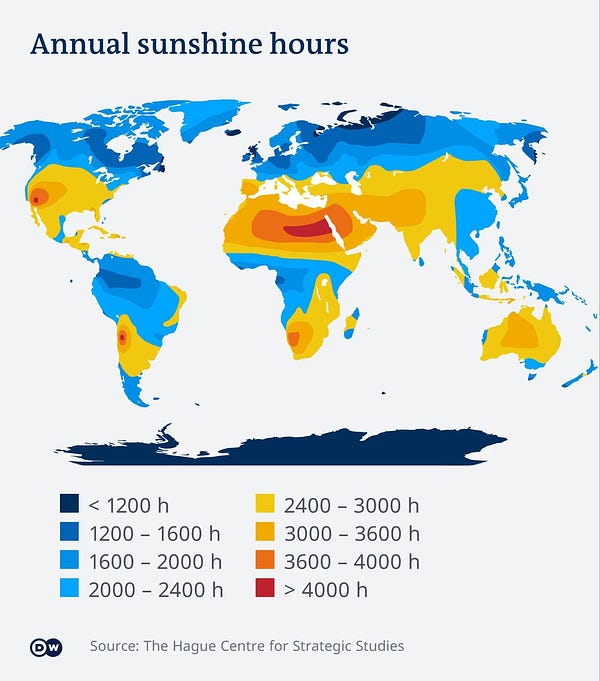Does Weather Affect Mood, And Separately, Does Climate Affect Happiness?
A pretty deep dive into whether it’s worth moving for better weather 🌦
In real life, a popular form of small talk is to talk about the weather. Online, a popular form of engagement bait is to talk about the weather, while making some kind of clever observation about how it relates to happiness across different locations.



It’s extremely common for people to yearn for sunnier or warmer places. It’s very common for people to go for vacations in sunny and warm places. And it’s reasonably common for people to actually move to such places and say that their quality of life has increased. At the same time, the happiest countries are usually the northernmost ones, and in practice people don’t migrate in huge numbers to the tropics. What’s up?
First, let’s get the obvious and boring hypotheses out of the way, so we can focus on more interesting stuff. For instance:
Happiness depends on many factors. E.g. the Scandinavian countries are happy thanks to welfare programs or whatever, despite their bad weather.
Happiness is really hard to measure and nothing meaningful can ever be said about it.
People react differently to the weather, so nothing meaningful can ever be said about its relationship to happiness.
“Sunlight puts me in a good mood, so obviously it boosts happiness.”
All of these are valid points, but they’re kind of sterile. Accepting that happiness is multifactorial and tricky to measure, that people have different tastes, and that your (and my) personal experience provides anecdotal evidence that sunshine is nice, what can we say about the weather-happiness relationship?
The first thing I would say is that it’s important to distinguish the short and the long term, for both happiness and weather. It seems pretty clear to me that:
daily mood is distinct from (though probably related to) long-term life satisfaction
daily weather is distinct from (though definitely related to) long-term climate
In other words, I’d be wary of people concluding that because they’re in a good mood on a sunny day, that means that sunny weather all year long will definitely make them more satisfied with their life. That seems to be the same kind of error that climate change skeptics make when they doubt global warming based on a single cold day, or that climate change activists make when they ring the alarm based on a single extreme weather event.
Another thing to note is that “weather” and “climate” both have many dimensions: sunniness and cloud cover, temperature, amount and type of precipitation (rain, snow, whatever “wintry mix” is supposed to be), wind, humidity, etc. Often these things cluster together, e.g. a sunny region may also be warm, but not always.
Additionally, the patterns of each of these variables can differ over time. Two places could have an average temperature of 14°C, but one could be fairly close to the average throughout the year, while the other experiences huge differences between (or even within) seasons. After all, 14°C (57°F) is the average temperature of the Earth, which doesn’t say much on how people experience temperature in their lives.
We already see that our research question cannot be straightforward. We could mix and match any of the above factors. “Are people in a better mood on a humid day” is very different from “Are people more satisfied with their life when they live in countries where the temperature never dips below freezing?”
With these messy caveats in mind, what does the scientific research say?
To make things easier for everyone, let’s use the following groundbreaking emoji-based system to flag the papers according to what they studied.
Happiness:
🙂 = mood
📈 = long term life satisfaction
Timescale of weather data:
📆 = daily weather
🌍 = climate / where you are in the world
Types of weather data:
🌞 = sunshine
🌥 = cloud cover (probably similar to sunshine but whatever)
🌡 = temperature
💦 = humidity
🌬 = wind (speed, power, or direction)
☔️ = precipitation
🧭 = atmospheric pressure (it’s a compass emoji but let’s pretend it’s a barometer)
💡 = photoperiod or luminance, when it is distinct from sunshine
🌗 = lunar phases (really)
Without further ado …
✨ A Literature Review, Made the Least Boring Possible With Emoji ✨
Our tour of the literature begins in 1979 with a paper titled “Weather, mood, and helping behavior: Quasi experiments with the sunshine samaritan” (Cunningham 1979). The “quasi experiments” involved asking people to help an interviewer, or looking at whether they gave tip to a waitress, and studying the relationship with the weather at the time. Our intuitions are already somewhat confirmed: people were more likely to help and give tips when there was more sunshine, and also the waitresses’ mood changed with sunshine and temperature. On the other hand, the author apparently also found a relationship with the lunar phases, so I’m not sure what to make of this study, which anyway I haven’t been able to read beyond the abstract because I couldn’t access the paper, even through Sci-Hub. 🙂 / 📆 / 🌞🌡💦🌬🌗
Soon after, Schwartz & Clore (1983) investigated the link between mood and life satisfaction, which is pretty important to what we’re looking at. Conveniently, they did this by (among other methods) comparing sunny and rainy days, and found — to no one’s surprise — that people were more likely to have good mood on sunny days. Since mood influences how much people are likely to say they’re satisfied with their life, sunny days were also correlated with higher reported life satisfaction. 🙂📈 / 📆 / 🌞☔️
The aforementioned Schwartz & Clore just randomly called students from the directory of the University of Illinois at Urbana-Champaign on either sunny or rainy days. What if you follow people for a longer period and track their mood? For that matter, what if you break up the concept of “mood” into ten parts? Enter Howarth & Hoffman (1984), who studied 24 male subjects over 11 consecutive days. They looked at the following ten mood variables: concentration 🧘, cooperation 🤝, anxiety 😬, potency 🫅, aggression 😡, depression 😞, sleepiness 🥱, scepticism 🧐, control 😌, and optimism 😃.1 They also looked at many weather variables, including “hours of sunshine, precipitation, temperature, wind direction, wind velocity, humidity, change in barometric pressure and absolute barometric pressure.” Humidity was the most influential factor, reducing concentration and increasing sleepiness, for instance. Sunshine and temperature also impacted mood, the latter by lowering anxiety and scepticism. 🙂 / 📆 / 🌞☔️🌡🌬💦🧭
Fast-forward to the 21st century, and now people start getting interested in comparing countries and climates. Rehdanz & Maddison (2005) looked at self-reported happiness in 67 countries, and characterized the associated climates by temperature and precipitation. They found that higher mean temperatures in the coldest month increase happiness, whereas higher mean temperatures in the hottest month decrease happiness. Also, “people living in regions with many dry months would prefer more precipitation.” In other words, people don’t like extremes. Not the most surprising result, but it’s notable that the paper says climate has a clearly significant impact on self-reported happiness. 📈 / 🌍 / ☔️🌡

Barrington-Leigh (2008) was concerned with whether weather weathers sweaters. Sorry, that was just kinda fun to write. Barrington-Leigh was concerned with whether weather biases reports of satisfaction with life, which could be a concern with studies of happiness in general. He used Canada-wide surveys of life satisfaction and matched the answers with the weather archive data of the day they were made. In slightly contradictory fashion, he found that cloud cover has a large and significant effect on life satisfaction responses, but ultimately concludes that there is no strong weather effect on reported happiness, which he notes is “surprising and mysterious.” 📈 / 📆 / 🌥☔️🌡2
Going back to mood, Denissen et al. (2008) did an online diary study of 1,233 people. They looked at six weather parameters (temperature, wind power, sunlight, precipitation, air pressure, and photoperiod) and three mood parameters (positive affect 😀, negative affect 🙁, and tiredness 🥱). Sunlight had some effect, especially on negative effect and tiredness but their main conclusion is that “the average effect of weather on mood was only small” although, interestingly, they noted that there was a lot of seemingly random variation across people. 🙂 / 📆 / 🌞☔️🌡🌬🧭💡
Speaking of people being diverse: that is Klimnstra et al. (2011)’s way of reconciling with everybody’s “yeah obviously weather influences mood, are you kidding me?” attitude with the fact that there’s weak scientific evidence for it. They studied the mood of teenagers over 30 days, and then did the same with the teenagers’ mothers, and identified 4 types of people:
Summer Lovers who have better mood when it’s warm and sunny;
Summer Haters whose mood gets worse with warmth and sun;
Rain Haters who are especially negatively affected when it rains;
Unaffected people whose mood just doesn’t vary with the weather.
Other studies conflate all these types, which may be why a lot of the results in this field are inconclusive. In this taxonomy, I think I’m a Summer Lover. I’d be curious to know the distribution of each type in the general population, but I couldn’t find that info. 🙂 / 📆 / 🌞☔️🌡
In Estonia, a country with crappy weather according to me, a person who is able to say this because I spent all of four hours in Tallinn once in November 2015, Kööts et al. (2011) studied the relationship between mood and hourly weather during two Estonian seasons. They found a few effects, like the surprising fact that negative affect mood was associated with higher temperatures, but they noted that all the effects they found were small. 🙂 / 📆 / 🌡💦🧭💡
Remember Rehdanz and Maddison from 4 studies ago? Well, they published another in 2011, except they swapped their names: Maddison & Rehdanz (2011). Also, they looked at 79 countries instead of 67. They used the World Values Survey, a big international database of answers to many questions, including “All things considered, how satisfied are you with your life as a whole these days?” They compared that against an elaborate index for temperature that they call “degree-months”: the “cumulated monthly deviations from a base temperature of 65°F (18.3°C).” Their result is that people in countries with lots of degree-months are less satisfied with their life. In other words, people don’t like extremes — also, as it turns out, the conclusion attained by Rehdanz & Maddison (2005). 📈 / 🌍 / 🌡
Okay, that’s a lot of papers, but we have more to look at. So it’s time for an…
🏞 Intermission! 🌃
Take a break, go for a short walk if it’s nice out. Or open a window from a random place in the world, and look at the weather there. Or look at another beautiful travel ad by Roger Broders:
All right, all rested? Let’s keep going.
✨ Back to the Regular Program ✨
2013 was a big year in the field of the weather-happiness relationship, with at least three relevant studies. In Japan, Tsutsui (2013) tracked the mood (he calls it happiness, but it’s daily happiness) of 75 Osaka university students. He found that “subjective happiness is negatively related to temperature and humidity. In a quadratic model, happiness is maximized at 13.9 degrees Celsius. The effects of other meteorological variables—wind speed and precipitation—are not significant.” 🙂 / 📆 / ☔️🌡🌬💦
In Germany, Kämpfer & Mutz (2013) studied three samples of large-scale surveys to conclude that people report a higher life satisfaction when it’s “exceptionally sunny” compared to “ordinary weather.” 📈 / 📆 / 🌞
There’s an American saying — go big or go home. In the United States, Lucas & Lawless (2013) went big. They studied the data from 1 million Americans from all 50 American states, over 5 years. This extremely high-powered analysis found no link between life satisfaction and most daily weather conditions. The few weak links that they found, they attribute to just having humongous amounts of data. As a result, they believe that their conclusion refutes the many previous studies that did find a link between life satisfaction and daily weather. They even managed to criticize Kämpfer & Mutz even though their paper wasn’t even published yet. 📈 / 📆 / 🌥🌡💦🌬☔️🧭
Schmiedeberg & Schröder (2014) agree that small samples are the root of all evil, and try to replicate Kämpfer and Mutz (2013), but with more German survey data. And indeed they found that there was no effect of “nice weather” on general life satisfaction or other satisfaction measures. At this point it’s not looking great for Kämpfer & Mutz. 📈 / 📆 / [“nice weather”]
Rammstedt et al. (2015) studied neither mood nor satisfaction, but something related: personality ratings. I.e., these: Extraversion, Agreeableness, Conscientiousness, Neuroticism, and Openness to Experience. I’m including this study here because these are very likely to be related to mood. But the results aren’t that exciting. Mostly, Openness to Experience is lower on rainy days and Conscientiousness is lower on sunny days. Cool. [personality ratings] / 📆 / 🌞☔️
So far we’ve seen a lot of weather studies and very few climate ones. Also, almost no countries from The Global South. In “Climate and Happiness in the Tropics,” Yusuf et al. (2016) looked at the link between self-reported well-being and two components of climate, rainfall and temperature, across Indonesia. No such link exists between happiness and temperature, “as expected because tropical country like Indonesia does not have much temperature variation.” Rainfall does have an effect, though, but not linearly: “higher rainfall is associated with more happiness but it reduces it after some point.” In other words, people don’t like extremes. 📈 / 🌍 / 🌡☔️
Back to rich countries, Rajani et al. (2019) used the large samples of the Eurobarometer survey to study a wide spectrum of factors on life satisfaction in 27 EU states. Their analysis failed to find any associations with mean temperature and precipitation. 📈 / 🌍 / 🌡☔️
In what might be the most original study on this list, Jonauskaite et al. (2019) — wait, I feel like I have to point out that the “et al.” here is doing an impressive amount of work: Jonauskaite has 59 co-authors! And these 60 people studied… the color yellow. Yellow is often associated with joy. This might be because yellow is reminiscent of sunshine and nice weather. If that’s true, then the association might be stronger in countries that have less sunshine. Is it? Yes!

People in countries that are 1) far from the equator and 2) rainy tend to associate yellow with joy. Now that I’ve written this, I’m not sure that it says anything one way or another about happiness, but it sure is an interesting data point. 🟡 / 🌍 / ☔️💡
All right, just two more studies. In the vein of Barrington-Leigh above, Benhke et al. (2021) wanted to know if weather could bias laboratory experiments on human subjects. They examined the full gamut of weather, from temperature to air pressure to humidity, cloud cover, precipitation, wind speed, and sunshine duration, and found basically nothing. Only temperature had a noticeable effect on affective valence (which as far as I can tell is similar to mood), and even then the effect was small. So if you run laboratory experiments on human subjects, this doesn’t seem worth worrying about. 🙂 / 📆 / 🌥🌡💦🌬☔️🧭💡
Finally, last year, Kanazawa et al. (2022) published a study that is guaranteed to make all of this very awkward. They examined the effect of sunny climate on happiness (as reported for the past seven days, so I’m gonna call that mood), but they considered an extra variable: intelligence. I’ll just quote the result from the title of the paper: “Sunshine on my shoulders makes me happy... especially if I’m less intelligent.” Like I said, awkward. They hypothesize that this goes all the way from our days in the savanna where darkness was dangerous, but where being smart could help you deal with the danger better. I don’t know, man. I guess it makes sense that something would predict that some of us are Summer Lovers or Rain Haters or whatever, but I’m not comfortable discussing this further, so I’ll stop here. 🙂🧠 / 🌍 / 🌞
Whew, that was a lot. (And I could have kept going, since I found more sources while skimming the literature review sections of some of the papers, but one has to stop somewhere.)
So, what do we think?
Looking at the studies on mood (🙂), all nine found a link of some kind with the weather or climate, though in many cases the link was weak. This agrees with most people’s intuition, I think. Most of us react to the weather but it’s rarely the most important factor in how we feel.
We also have nine studies of life satisfaction (📈), but we’ll separate them into daily weather (📆, 5 studies) and climate (🌍, 4 studies).
The five 📈 / 📆 studies are evenly split: two found a link (Schwartz & Clore; Kämpfer & Mutz), two found no link (Lucas & Lawless; Schmiedeberg & Schröder), and one is sort of in between (Barrington-Leigh). But the no-link studies here look more convincing, because they have larger sample sizes. Overall I’m guessing that this is still a somewhat controversial issue, but the evidence leans against daily weather having a big impact on long-term satisfaction with life.
… Or at least on how people report their long-term satisfaction. I don’t think any of the 📈 / 📆 studies claimed to get fully accurate pictures of people’s happiness. They were more concerned with the possibility of bias in self-reported answers. And that makes sense: as I said earlier, combining daily weather and actual long-term happiness, as opposed to a snapshot of long-term happiness, is usually a category error.
So let’s look at the four 📈 / 🌍 studies, the ones that could answer the question implied by the tweets at the beginning of the post: should you move to a place with a better climate? It looks like the answer is… maybe? On the one hand, the big Eurobarometer study found no association between life satisfaction and climate whatsoever. On the other hand, the Indonesia study did find that rainfall has a significant effect, while the two studies by Rehdanz & Maddison, or Maddison & Rehdanz, found an effect for temperature.
In these three studies, though, the effect is not linear. People don’t like to have too little rainfall, or too much. They don’t like when the coldest month is really cold, or when the hottest month is really hot. They don’t like to have too many “degree-months,” i.e., deviations from 18°C/65°F. In other words, people don’t like extremes.
It’s not a mind blowing result, but I guess I do conclude, with weak confidence, that most people are happier when they live in places with stable, moderate climates: not too dry, not too rainy, not too hot, not too cold.

But really, the main takeaway is that the boring hypotheses from earlier were mostly right.
Happiness definitely depends on a lot more factors than the weather or climate. Wealth is one. It’s possible that two areas have comparable wealth and are different only in terms of climate, in which case, if you can choose, you’ll want to pick the place with the best climate. In practice, though, places differ enormously along the wealth axis, so we rarely get such an easy choice. It gets worse when you add in more factors like job availability, immigration policies, proximity to family, culture, and so on.
(I wonder if much of the weather-happiness discourse just comes from the fact that Americans, specifically, do have a fairly even choice between two areas of comparable wealth with distinct climates: California and the Northeast.)
More importantly, people really do differ in the relationship to the weather. A few of the studies above explicitly said so: the one on Summer Lovers3 etc., the one that noted “random variation across individuals,” and even, in a way, that disturbing study on intelligence. We all like different things, and we like them in ways that are difficult to take into account when doing a study of life satisfaction.
I came to this topic with an attitude of skepticism. I broadly agreed with this article, which claims it’s pointless to move primarily for better weather: it takes a short time to get used to the sun or warmth or whatever you’re after, and then the psychological benefits just evaporate. Instead, it’s better, if you can afford it, to take a short vacation during the winter (or whatever your worst season is). That’ll improve your mood for some time, and therefore, maybe, your happiness. Plus, it’ll provide variety. Living in a tropical country with perfect all-year weather seems like it could get pretty boring — which doesn’t mean bad! It just means that the weather is not going to have a noticeable effect on your well-being. To someone in Indonesia or elsewhere in the tropics, nice temperature is just business as usual.
But maybe you’re the kind of person for whom happiness means taking long walks under the morning sun, and living in a place where the morning sun is a rare occurrence might mean less happiness. Or maybe you love skiing, and living in a place with no snow would make you miss it and make you less happy. Or maybe you don’t really care about the weather per se, but really dislike snow just because it’s inconvenient.
I still believe that the effects of climate are somewhat overrated in public discourse. For most people, weather doesn’t matter nearly enough, compared to other factors, to justify a move. But for a minority, it might. If you’re confident that you’re part of that group, then that’s something worth looking into — but first try frequent vacations if you can.
As for myself, I know I value variety quite a lot, so living in a place with really cold winters and really warm summers, and everything in between, seems right.
Then again, I do find the winters here too long, and I’ve never lived in the tropics, so maybe I’m missing out.
The emoji are mine and may not be accurate representations of the cited moods.
After having written the literature review, I found a second study by Barrington-Leigh, from 2017, saying essentially the same thing: “Although being statistically significant, the effect of weather on life satisfaction is small compared with major socioeconomic determinants of well-being.”
This sounds like a very lame romantic comedy from, like, four decades ago.















I know that just one data point isn't all that useful, but I'm noticably happier on warm, cloudy days! What can I say, I really enjoy being able to stare at the sky without going blind. And also being half-asleep for a full 24 hours.
Don't get too down and out about the Kanazawa paper, by the by. I have a strong suspicion that they are actually measuring "The Nerd Effect", rather than some deep rooted evolutionary phenomenon. Nerdy activities like reading, complicated board games, and (at least in the mid 90s to mid 00s, when these people were surveyed) video games and the internet can be equally enjoyed in sunny and rainy weather. As such, sunlight doesn't have a huge effect on nerds, since they still get to do most of the things they already enjoy. Meanwhile, sports, travel, or even just hanging out with friends, activities with a much broader appeal, are highly dependent on the weather. Once the sun disappears, the less intelligent crowd gets cooped up indoors, with nothing to do. The activities they prefer are more explicitly tied to sunshine, so sunshine has a bigger impact on their happiness.
Though, to be fair, this doesn't explain why intelligent people are happier overall. More capable of achieving their goals, maybe? Or maybe they're just better at convincing themselves bad stuff doesn't exist?
I'd actually like to see this study repeated with more recent data. My gut says, now that several nerdy activities have gone mainstream, the sunlight difference among unintelligent people won't be nearly as pronounced.
I find it really interesting that studies on mood never seem to dig deeper as to *why* certain things might have a mood impact. For example, large swings in barometric pressure give me headaches! So if you were to ask me some mood vs. weather questions, my answer would probably depend on how close the nearest high- or low-pressure system is.
Did any of the studies you looked at do any digging along these lines?
Also, I'm thirding the request for a book. I'm one of the people who found your blog through the Meso-American Tech Wizards post and I immediately binged your entire archive because your posts are always interesting, informative, and entertaining. I don't know how you would organize this blog into a book, but it would be fun to have a physical copy of your best posts in a few years!